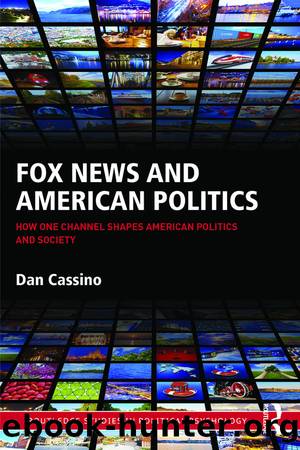Fox News and American Politics: How One Channel Shapes American Politics and Society by Dan Cassino

Author:Dan Cassino [Cassino, Dan]
Language: eng
Format: epub
Tags: Social Science, Reference, Political Science, General
ISBN: 9781317479987
Google: Rnr7CwAAQBAJ
Goodreads: 27849495
Publisher: Routledge
Published: 2016-04-14T09:19:24+00:00
Other News Sources
In contrast to the effects of ideological media, political moderates learn the most by turning to NPR, The Daily Show and Sunday morning news programs (leaving aside the category of âwebsites,â which is too nebulous to analyze very deeply). What all of these sources have in common is an eschewing of the debate format: theyâre much more likely to feature longer interviews with individuals holding a particular point of view. Because thereâs no opposition to that individual presented on the program, it falls on the host to ask questions, to poke and prod, and the individual being interviewed has the opportunity to make complex arguments without being interrupted. This, it seems, gives viewers a great deal more information than the programs on ideological media.
This may explain why NPR and The Daily Show are more informative than other media sources â but why are Fox News and MSNBC so bad for viewersâ level of information? One possible explanation comes from the amount of news people are watching. There are only so many hours in a day, and one spent watching MSNBC canât also be spent listening to NPR. So, if a conservative were not watching MSNBC and getting no informational value out of it, he or she might be watching or listening to something else. As a result, MSNBC viewers wind up with less knowledge than those not spending part of their news watching budget on that channel. However, the data just doesnât seem to bear this out. Using the 2010 ANES data, itâs possible to examine the relationship between how much time someone spends watching Fox News or MSNBC, and how many nights per week spent watching a non-ideological news source: network evening news broadcasts, as in Figure 5.6. If the negative effects of Fox and MSNBC are driven by less overall news consumption among their viewers, then people who watch more shows on those channels should be less likely to watch the evening news broadcasts â but itâs actually the opposite.
Actually, the more Fox News and MSNBC people watch, the more nights theyâre likely to watch the national evening news broadcasts. Thereâs also a significant interaction with ideology â at least for MSNBC viewers â such that ideologues who watch more news that matches their ideology wind up watching more non-ideological news in general. This holds true no matter what measure is used for the total amount of political information consumed: people who consume more ideological media also consume more non-ideological media. It also holds when the analysis divides up ideological and non-ideological sources on ideological channels. For instance, Fox News viewers who watch The OâReilly Factor rather than Fox Report (a less ideological program), but watch the same number of Fox Shows overall, seek out more non-ideological news. As such, it canât be that theyâre spending less time on more informative news sources: rather, the negative informational effects of the ideological media sources (especially on viewers with clashing ideologies) must be a function of the content of the media.
Download
This site does not store any files on its server. We only index and link to content provided by other sites. Please contact the content providers to delete copyright contents if any and email us, we'll remove relevant links or contents immediately.
The Secret History by Donna Tartt(19088)
The Social Justice Warrior Handbook by Lisa De Pasquale(12190)
Thirteen Reasons Why by Jay Asher(8910)
This Is How You Lose Her by Junot Diaz(6887)
Weapons of Math Destruction by Cathy O'Neil(6280)
Zero to One by Peter Thiel(5802)
Beartown by Fredrik Backman(5754)
The Myth of the Strong Leader by Archie Brown(5507)
The Fire Next Time by James Baldwin(5446)
How Democracies Die by Steven Levitsky & Daniel Ziblatt(5219)
Promise Me, Dad by Joe Biden(5153)
Stone's Rules by Roger Stone(5088)
A Higher Loyalty: Truth, Lies, and Leadership by James Comey(4964)
100 Deadly Skills by Clint Emerson(4925)
Rise and Kill First by Ronen Bergman(4789)
Secrecy World by Jake Bernstein(4753)
The David Icke Guide to the Global Conspiracy (and how to end it) by David Icke(4720)
The Farm by Tom Rob Smith(4512)
The Doomsday Machine by Daniel Ellsberg(4490)
